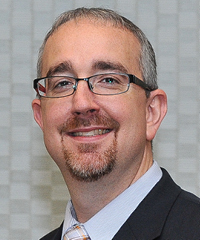Neurology
Multiple Sclerosis
Education and Counseling for Patients With Multiple Sclerosis
Overview
Timely, scientific, professional communication about multiple sclerosis (MS) remains a growing need. Many organizations, such as the Consortium of Multiple Sclerosis Centers (CMSC) and the National Multiple Sclerosis Society (NMSS), are now offering patient-oriented information about MS. Our featured expert shares how his clinic is using educational materials and counseling to elevate the level of patient care.
Expert Commentary
Scott Newsome, DO, MSCS, FAAN
|
|
“Increasing patient touchpoints (eg, face-to-face visits, telephone calls, e-mail correspondence, Web portal) improves adherence to both pharmacologic and nonpharmacologic treatments. I believe that this has a positive impact on outcomes over time.”
In my view, the NMSS and the CMSC have both put forward effective educational materials for patients with MS and for the clinicians who help provide care for these patients. The NMSS Website provides patients with access to a wealth of downloadable materials on many different aspects of MS, including information on recent diagnosis of MS, signs and symptoms of MS, and a review of various therapies for MS. I often recommend to my patients, no matter where they are on the continuum of MS, to visit the NMSS Website. The CMSC Website is geared more toward clinicians; however, the organization is starting to bolster its patient education materials as well. A positive feature of these Websites is that they are not biased toward any particular therapy or treatment philosophy. Additionally, peer support programs that are offered by these organizations can be of great educational value.
With the time constraints and other challenges that we face in health care, materials from these Websites prove to be invaluable aids for education. When you are speaking with patients about the many different issues related to their condition and treatment, there is a tendency to not emphasize patient education. These materials help to reemphasize what we discuss in the clinic.
With regard to counseling, we strive to maintain an open door policy by encouraging our patients to contact us via telephone or e-mail or by sending a message through our health system portal whenever they have questions or concerns about their condition or treatment. Whether it is a new issue or a preexisting issue, their physician and/or a member of the team usually responds to them on the same day. If the issue at hand requires an office visit, we strive to get the patient in quickly with someone from our team (eg, treating physician, advanced practice provider). In our practice, we also have a whole cadre of neuroimmunology fellows, and part of their training is to contact patients via telephone to keep them directly involved with patient care and counseling.
There is much ongoing dialogue between health care providers and patients between visits, which elevates the level of patient care and gives our patients a sense of empowerment and peace of mind because they know that they do not have to wait for their 6-month follow-up visit to address their questions. Increasing patient touchpoints (eg, face-to-face visits, telephone calls, e-mail correspondence, Web portal) improves adherence to both pharmacologic and nonpharmacologic treatments. I believe that this has a positive impact on outcomes over time.
References
Consortium of Multiple Sclerosis Centers Recommendations for Care of Those Affected by Multiple Sclerosis. https://cdn.ymaws.com/www.mscare.org/resource/resmgr/docs/cmsccareofthoseaffectedbyms.pdf. Accessed September 14, 2018.
National Multiple Sclerosis Society. Talking to patients. https://www.nationalmssociety.org/For-Professionals/Clinical-Care/Resources-for-You-and-Your-Practice/Publications/Talking-to-Patients. Accessed September 14, 2018.
Rae-Grant A, Day GS, Marrie RA, et al. Practice guideline recommendations summary: disease-modifying therapies for adults with multiple sclerosis: report of the Guideline Development, Dissemination, and Implementation Subcommittee of the American Academy of Neurology. Neurology. 2018;90(17):777-788.











